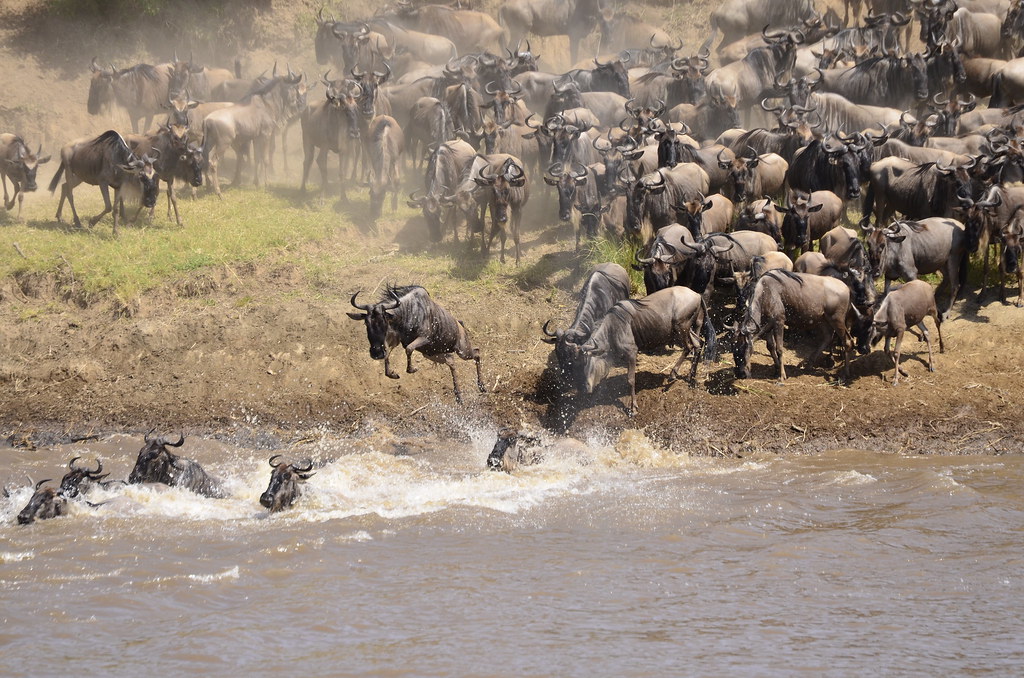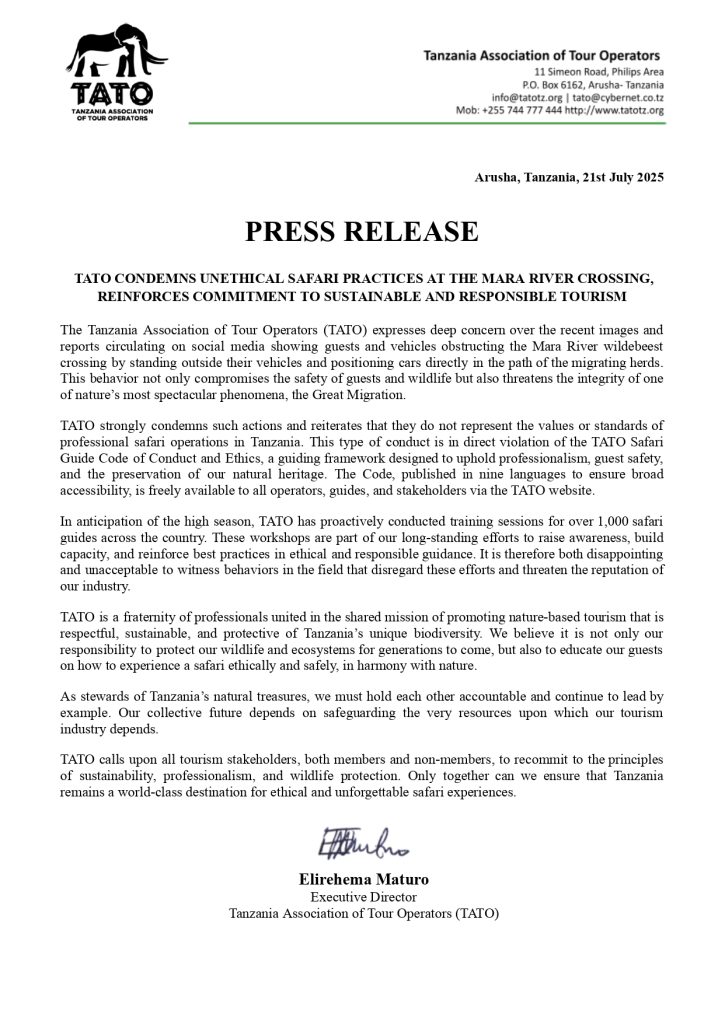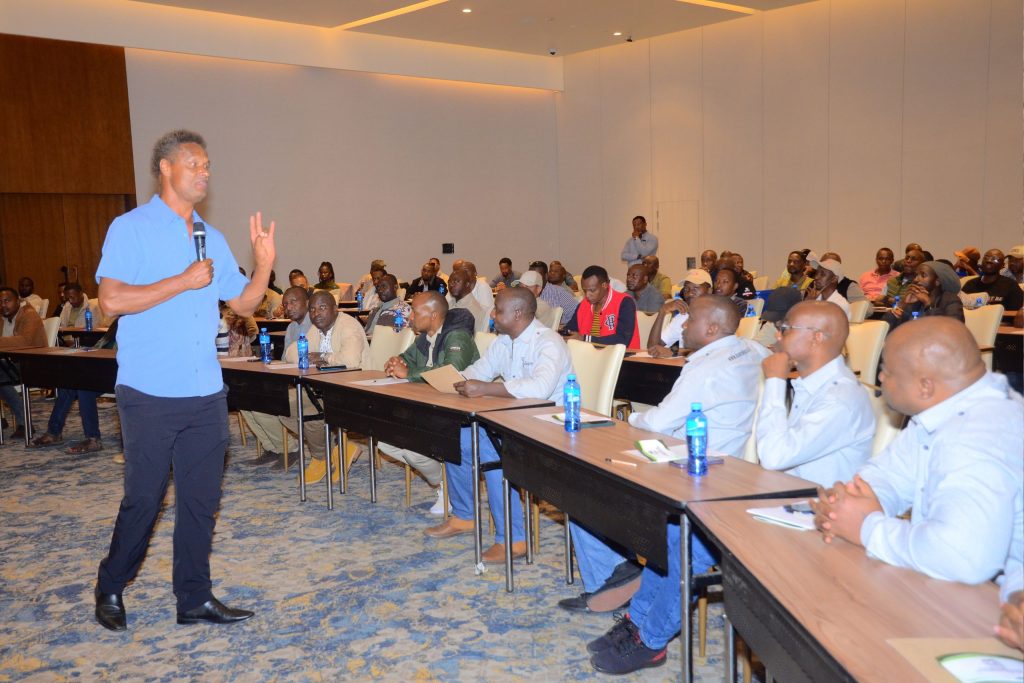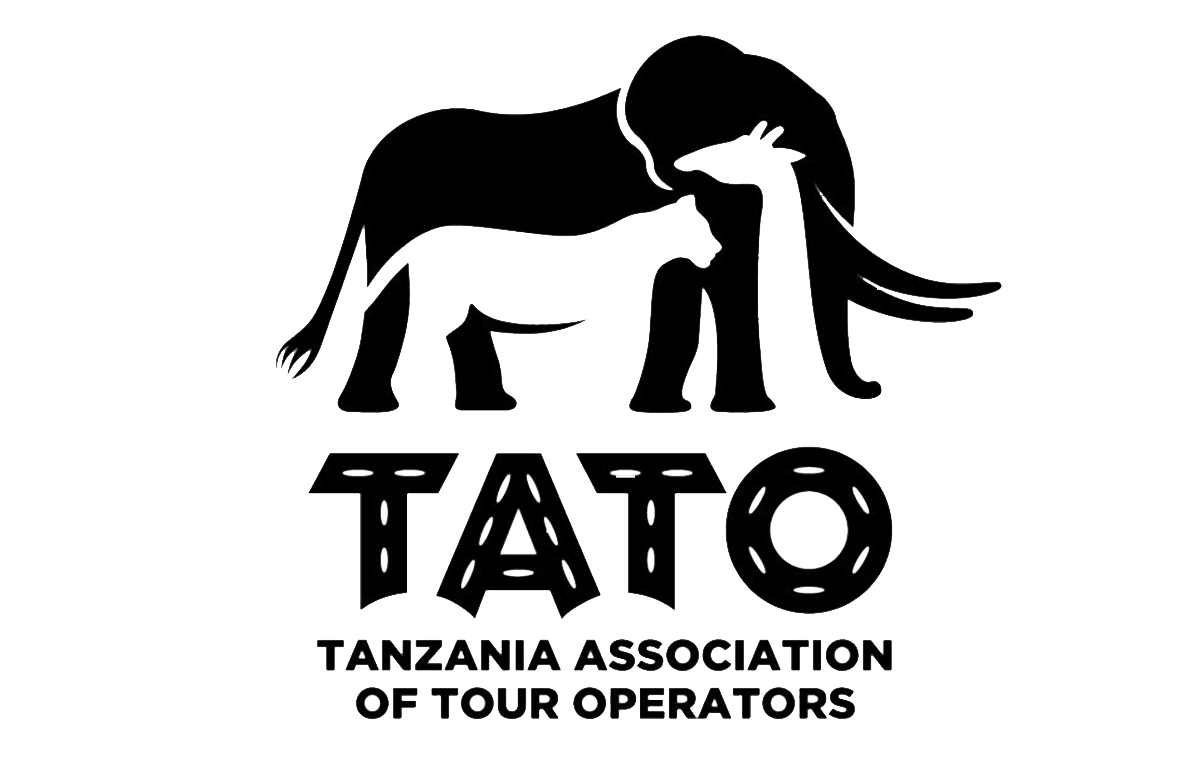TATO Condemns Unethical Safari Practices at the Mara River Crossing

The Tanzania Association of Tour Operators (TATO), the umbrella body representing over 300 registered tour operators across Tanzania, has issued a strong condemnation of recent unethical safari practices witnessed at the iconic Mara River wildebeest crossing, one of the most critical and dramatic moments of the Great Migration.
Disturbing images and videos have surfaced on social media platforms, showing tourists and safari vehicles violating basic wildlife viewing protocols by leaving vehicles, blocking river pathways, and positioning themselves dangerously close to migrating herds. These actions not only endanger the lives of the guests themselves but also stress and disrupt the natural patterns of wildlife, particularly during this sensitive period of the migration.
A Grave Concern for Wildlife and Tourism Safari Practices
The Great Migration is one of the most spectacular wildlife events on the planet, where millions of wildebeest and zebras cross the Mara River in search of greener pastures. This natural phenomenon is a cornerstone of Tanzania’s tourism appeal, drawing visitors from around the world.
TATO views the recent behavior as highly inappropriate and incompatible with both conservation principles and responsible tourism practices. Such conduct undermines years of progress in positioning Tanzania as a leading destination for ethical and sustainable wildlife tourism.
“This is not just a matter of bad behavior; it’s a serious threat to our industry’s sustainability and credibility,” said a spokesperson from TATO. “We strongly denounce these actions and affirm that they are in direct violation of the ethical Safari Practices standards that guide our profession.”

Upholding the Safari Guide Code of Conduct and Ethics
TATO operates under a clearly defined Safari Guide Code of Conduct and Ethics, developed in consultation with stakeholders and conservation experts. The Code lays out essential standards for behavior in wildlife areas, including rules on wildlife interaction, vehicle positioning, guest safety, and environmental respect.
Published in nine different languages and available for free download via the TATO website, the Code is meant to reach the widest possible audience—both guides and guests. It is a foundational tool in our collective responsibility to ensure respectful and informed behavior in Tanzania’s national parks and conservation areas.
Training and Capacity Building: A Proactive Approach
In preparation for the 2025 peak tourist season, TATO has invested significantly in guide training and capacity building. Between March and May alone, over 1,000 safari driver guides from across the country participated in intensive workshops focused on professionalism, safety, ethics, Ethical Safari Practices and guest management.
“These workshops were designed not only to improve service delivery but to reinforce a culture of responsibility and pride in Tanzanian guiding standards,” noted a TATO official. “It is deeply disappointing to see actions in the field that appear to ignore or undermine these investments.”

Tourism and Conservation Are Intertwined
Tanzania is globally revered for its pristine natural beauty, vast protected areas, and rich biodiversity. Tourism accounts for a significant portion of the country’s GDP and foreign exchange earnings, but it relies fundamentally on the health and integrity of its natural environments.
TATO maintains that all stakeholders like operators, guides, guests, and regulatory bodies must act as stewards of the environment to provide Ethical Safari Practices. Conservation and tourism are not separate domains; they are intertwined and mutually dependent.
When a guest or operator disrupts a natural event like the wildebeest crossing, the damage is not only ecological but reputational. It threatens the very foundations upon which Tanzania’s tourism economy is built.
Educating Tourists: A Shared Responsibility
Beyond professional conduct, TATO believes that education is vital. Tourists must be made aware, before and during their travels, of the appropriate ways to engage with nature. The association encourages its members and all industry players to invest in guest orientation briefings, signage, guide communication, and informative materials that promote responsible behavior.
Tourism in Tanzania must not only meet the expectations of adventure and discovery but also cultivate respect, humility, and mindfulness in every encounter with wildlife and culture.
TATO’s Unwavering Commitment to Sustainability
TATO remains steadfast in its mission to promote nature-based tourism that is professional, sustainable, and inclusive. Our pillars of advocacy, research, training, and information sharing are geared toward shaping a tourism industry that respects both people and the planet.
This includes:
- Advocating for strict enforcement of park rules and penalties for violators.
- Encouraging investment in guide education and certification.
- Promoting diversity in tourism circuits to reduce pressure on key hotspots like the Northern Circuit.
- Working with government agencies, conservation authorities, and community stakeholders to protect fragile ecosystems.
A Call to Recommit to Responsible Safari Ethics
TATO calls upon its members and the wider tourism community to recommit to ethical practices that put the wellbeing of wildlife, guests, and local communities at the forefront. We urge all safari operators to strictly adhere to the Code of Conduct, provide comprehensive pre-safari briefings to their clients, and report any Unethical Safari Practices behavior witnessed in the field.
We also invite regulatory bodies to review monitoring mechanisms and enforcement protocols, particularly in high-traffic areas like the Serengeti-Mara ecosystem, to deter misconduct and protect the integrity of Tanzania’s world-renowned safari experience.
Conclusion
The actions captured at the Mara River are not reflective of Tanzania’s world-class tourism industry. They are outliers that must be addressed swiftly and decisively. As TATO, we reaffirm our unwavering commitment to defending the reputation, sustainability, and professionalism of Tanzania’s safari sector.
Together, let us protect the migration, honor our heritage, and ensure that every visitor to Tanzania experiences the wonder of nature in the respectful and sustainable manner it deserves.

